vuejs is not an API. vuejs is a progressive JavaScript framework for building user interfaces, designed to better organize and simplify web development. API refers to application programming interface, which is a set of predefined functions that provide applications and developers with the ability to access a set of routines based on certain software or hardware.

The operating environment of this tutorial: windows7 system, vue2.9.6 version, DELL G3 computer.
vuejs is not an API.
Vue (pronounced /vjuː/, similar to view) is a progressive JavaScript framework for building user interfaces, aiming to better organize and simplify web development. Unlike other large frameworks, Vue is designed to be applied layer by layer from the bottom up.
Vue’s core library only focuses on the view layer, which is not only easy to get started, but also easy to integrate with third-party libraries or existing projects. On the other hand, when combined with a modern tool chain and various supporting libraries, Vue is also fully capable of providing drivers for complex single-page applications (SPA).
Vue.js also provides MVVM data binding and a composable component system, with a simple and flexible API. Its goal is to achieve responsive data binding and composability through the simplest possible API. view component.
And API (Application Programming Interface, Application Programming Interface) are some predefined functions, the purpose is to provide applications and developers with access to a set of routines based on certain software or hardware capabilities without having to access the source code or understand the details of the inner workings.
Some APIs in vuejs
vm refers to the instance obtained by new Vue
(1) When the dom tag in After the value is bound to the value in data, changing the value corresponding to data can update the value in the tag in real time;
but the value added subsequently is invalid (binding fails).
(2) The object can be directly used as an attribute of data, which is valid (because the object is passed by value);
So the attribute and the object are congruent;
(3) The interfaces of vm are:
vm.$data is the data attribute of vm;
vm.$el is the dom node pointed to by the el attribute;
vm.$watch is to monitor attribute changes (such as the value in data) (refer to (9))
(4) The declaration cycle of the vue instance, there are several key functions:
created: After the event binding is completed, the function is directly used as an attribute in the vue instance when declaring the vue instance, the same below.
vm.$mount: Mount the dom node;
beforeCompile: before loading the template;
compiled: after loading the template;
ready: completed After (I guess);
beforeDestroy: before destruction;
destroyed: after destruction;
(5) vm.$mount (mounted id or class name )
When adding a new Vue instance, if you do not add el, it means that it will not be mounted and will only be generated. After generation, you can use this method to manually mount it to a certain place. If there are multiple ones that meet the conditions, Then mount it to the first place;
(6) v-for traverses arrays and objects, and can create multiple tags; for example, it is used to create tables;
(7) Escape: {{}} Two curly brackets will not escape the html tag of the value;
{{{}}} Three curly brackets will escape the html tag of the value and turn it into html text;
You cannot put bound data in the value (unless you use partials, but I don’t know how yet);
(8) Within the braces of interpolation, you can put expressions ( Functions cannot be placed);
(9) Within the curly brackets of interpolation, add the pipe symbol |, and you can use filters;
capitalize is a filter that capitalizes the first letter;
The filter can only be placed at the end of the expression and cannot be part of the expression;
The filter can add parameters;
The filter can be customized (but we don’t know how to customize it yet. defined method);
(10) Instruction:
v-if="variable name" Exists when a value is true;
v-bind: attribute Name = "Variable name" Bind the variable name after the equal sign (pointing to the attribute with the same name in the data attribute of vm) to the html attribute of the tag.
v-on: event type = "function name" When the event type is triggered, the function in methods is executed;
The abbreviation of v-on is @; the abbreviation of v-bind is: ( Colon);
(11) Computed attribute computed
The attribute here can be used as the data attribute; the advantage is that when the value in data changes, it will change together;
You can use more complex expressions (only simple expressions can be used in interpolation);
(12) Setters and getters of calculated properties
The default is getter (get attribute of the object), that is, when a certain value changes, the callback function (or get method) is triggered;
When the calculated property changes, certain values need to be changed (such as changing 10 values, it is not good to write monitoring this value elsewhere), then you need to set the setter (set attribute of the object), that is, when the calculated attribute changes, the set method is triggered;
(13) Monitoring attributes vm.$watch (monitored attribute, callback function)
What is monitored is the data attribute;
The first parameter of the callback function is the changed value, and the second parameter is the changed value The previous value;
Triggered when the value of the attribute changes;
(14) class binding:
Use v-bind:class
Class use In object form, the key is the class name, and the value indicates whether to display this class;
You can directly place an object object in the value of v-bind:class, and place this object in the data attribute. Just set the properties of this object object in this way;
Class array writing method: the members in the array are variable names. If the variable is not an object object, the value of the variable is the class name; if it is an object, the object The key is the class name, and the value indicates whether to display;
(15) style binding:
Use v-bind:style
The form is an object, the key of the object Is the style name (such as fontSize, note that the style name needs to be in camel case instead of css), and the value is the value of the style;
You can directly put the object name on the right side of the equation of v-bind:style;
Changes in the value of the object will affect the inline style in real time;
For some styles, you can add prefixes for the browser (but some are not compatible with all browsers);
Related recommendations: "vue.js Tutorial"
The above is the detailed content of Is vuejs an API?. For more information, please follow other related articles on the PHP Chinese website!
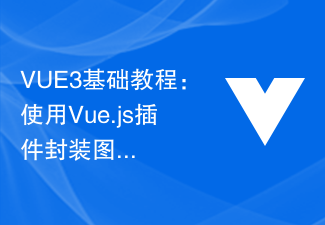 VUE3基础教程:使用Vue.js插件封装图片上传组件Jun 15, 2023 pm 11:07 PM
VUE3基础教程:使用Vue.js插件封装图片上传组件Jun 15, 2023 pm 11:07 PMVUE3基础教程:使用Vue.js插件封装图片上传组件Vue.js是一款流行的前端框架,它使开发者可以用更少的代码创建更高效、灵活的应用程序。尤其是在Vue.js3发布之后,它的优化和改进使得更多的开发者倾向于使用它。这篇文章将介绍如何使用Vue.js3来封装一个图片上传组件插件。在开始之前,需要先确保已经安装了Vue.js和VueCLI。如果尚未安装
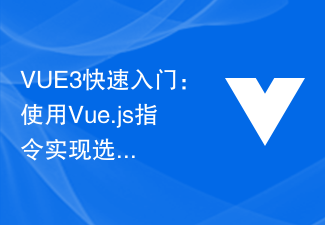 VUE3快速入门:使用Vue.js指令实现选项卡切换Jun 15, 2023 pm 11:45 PM
VUE3快速入门:使用Vue.js指令实现选项卡切换Jun 15, 2023 pm 11:45 PM本文旨在帮助初学者快速入手Vue.js3,实现简单的选项卡切换效果。Vue.js是一个流行的JavaScript框架,可用于构建可重用的组件、轻松管理应用程序的状态和处理用户界面的交互操作。Vue.js3是该框架的最新版本,相较于之前的版本变动较大,但基本原理并未改变。在本文中,我们将使用Vue.js指令实现选项卡切换效果,目的是让读者熟悉Vue.js的
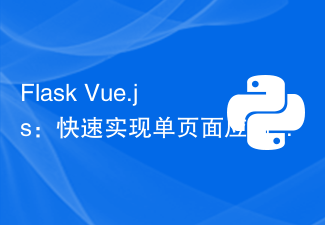 Flask + Vue.js:快速实现单页面应用Jun 17, 2023 am 09:06 AM
Flask + Vue.js:快速实现单页面应用Jun 17, 2023 am 09:06 AM随着移动互联网和Web技术的迅速发展,越来越多的应用需要提供流畅、快速的用户体验。传统的多页面应用已经无法满足这些需求,而单页面应用(SPA)则成为了解决方案之一。那么,如何快速实现单页面应用呢?本文将介绍如何利用Flask和Vue.js来构建SPA。Flask是一个使用Python语言编写的轻量级Web应用框架,它的优点是灵活、易扩
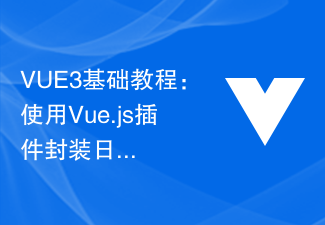 VUE3基础教程:使用Vue.js插件封装日历组件Jun 15, 2023 pm 09:09 PM
VUE3基础教程:使用Vue.js插件封装日历组件Jun 15, 2023 pm 09:09 PMVue.js是现代化的前端JavaScript框架之一,它提供了一套完整的工具来构建交互式用户界面。在Vue.js的生态系统中,有各种各样的插件和组件,可以大大简化我们的开发流程。在本篇文章中,我们将介绍如何使用Vue.js插件封装一个日历组件,以方便我们在Vue.js项目中快速使用。Vue.js插件Vue.js插件可以扩展Vue.js的功能。它们可以添加全
 Vue.js实现登录验证的完整指南(API、JWT、axios)Jun 09, 2023 pm 04:04 PM
Vue.js实现登录验证的完整指南(API、JWT、axios)Jun 09, 2023 pm 04:04 PMVue.js是一种流行的JavaScript框架,用于构建动态Web应用程序。实现用户登录验证是开发Web应用程序的必要部分之一。本文将介绍使用Vue.js、API、JWT和axios实现登录验证的完整指南。创建Vue.js应用程序首先,我们需要创建一个新的Vue.js应用程序。我们可以使用VueCLI或手动创建一个Vue.js应用程序。安装axiosax
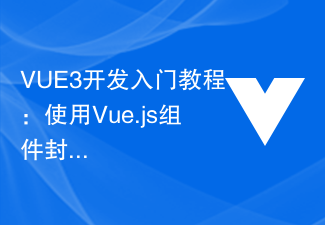 VUE3开发入门教程:使用Vue.js组件封装chart图表Jun 15, 2023 pm 10:29 PM
VUE3开发入门教程:使用Vue.js组件封装chart图表Jun 15, 2023 pm 10:29 PM随着大数据时代的到来,数据可视化已经成为了现如今的趋势之一。在Web前端开发的过程中,如何使用Vue.js进行数据可视化处理,成为了许多前端开发者所关注的问题。本文将会介绍如何使用Vue.js组件,封装基于chart.js库的图表。1.了解chart.jsChart.js是一款基于HTML5CanvasElement的简单易用、跨平台的开源图表库,我们可
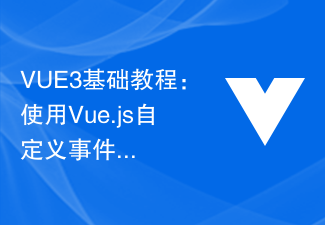 VUE3基础教程:使用Vue.js自定义事件Jun 15, 2023 pm 09:43 PM
VUE3基础教程:使用Vue.js自定义事件Jun 15, 2023 pm 09:43 PMVue.js是一款流行的JavaScript框架,它提供了很多方便的特性,所以它在开发Web应用程序时非常有用。Vue.js中的自定义事件系统使其更加灵活,并且可以通过组件事件触发和处理来实现更好的代码重用性。在本文中,我们将讨论如何使用Vue.js的自定义事件。Vue.js中自定义事件的基础在Vue.js中,我们可以通过v-on指令来监听DOM事件。例如,
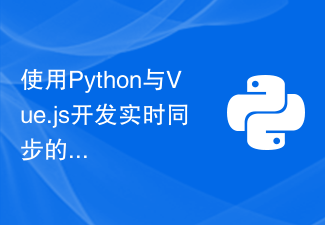 使用Python与Vue.js开发实时同步的Web应用程序Jun 17, 2023 am 08:28 AM
使用Python与Vue.js开发实时同步的Web应用程序Jun 17, 2023 am 08:28 AM随着Web应用程序的普及和用户体验的要求不断提高,实时同步已经成为了现代Web应用程序不可或缺的功能。在本文中,我们将介绍如何使用Python和Vue.js开发实时同步的Web应用程序。为了实现实时同步的功能,我们需要使用一些现代化的Web技术,其中包括WebSocket、异步编程和前端框架。以下是本文中将用到的技术栈:Python3.6+FlaskFla


Hot AI Tools

Undresser.AI Undress
AI-powered app for creating realistic nude photos

AI Clothes Remover
Online AI tool for removing clothes from photos.

Undress AI Tool
Undress images for free

Clothoff.io
AI clothes remover

AI Hentai Generator
Generate AI Hentai for free.

Hot Article

Hot Tools

SublimeText3 Mac version
God-level code editing software (SublimeText3)

SAP NetWeaver Server Adapter for Eclipse
Integrate Eclipse with SAP NetWeaver application server.

Atom editor mac version download
The most popular open source editor

mPDF
mPDF is a PHP library that can generate PDF files from UTF-8 encoded HTML. The original author, Ian Back, wrote mPDF to output PDF files "on the fly" from his website and handle different languages. It is slower than original scripts like HTML2FPDF and produces larger files when using Unicode fonts, but supports CSS styles etc. and has a lot of enhancements. Supports almost all languages, including RTL (Arabic and Hebrew) and CJK (Chinese, Japanese and Korean). Supports nested block-level elements (such as P, DIV),

SecLists
SecLists is the ultimate security tester's companion. It is a collection of various types of lists that are frequently used during security assessments, all in one place. SecLists helps make security testing more efficient and productive by conveniently providing all the lists a security tester might need. List types include usernames, passwords, URLs, fuzzing payloads, sensitive data patterns, web shells, and more. The tester can simply pull this repository onto a new test machine and he will have access to every type of list he needs.






